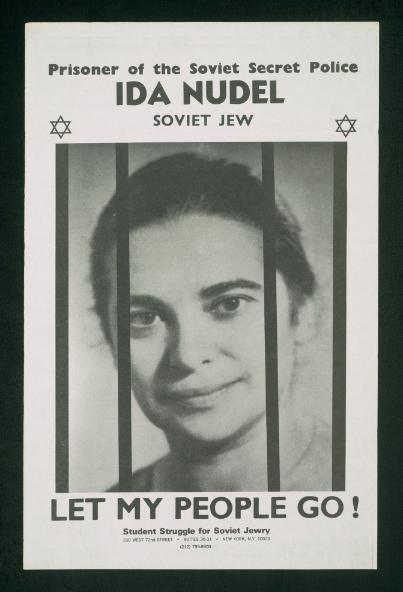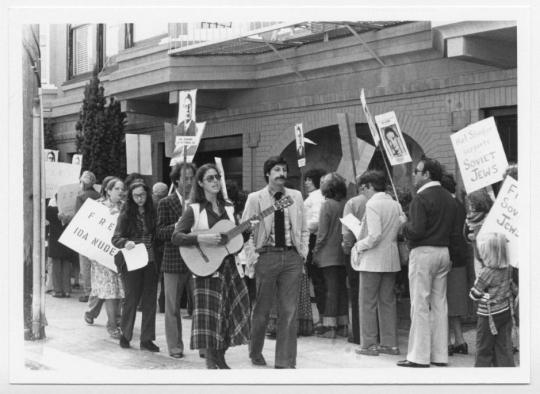By Andrey
Filimonov, Archival Services Manager at the Center for Jewish History
“Zions Captives”: documentary on Ida
Nudel (watch online: http://digital.cjh.org/4585693)
Original archival material found
Houston Action for Soviet Jewry Records I-500; box 35; VHS tape 022; American
Jewish Historical Society, New York, NY; PID http://digital.cjh.org/798129

Screenshot from “Zions Captives, documentary on Ida Nudel”
Original archival material found
Houston Action for Soviet Jewry Records I-500; box 32; VHS tape 022; American
Jewish Historical Society, New York, NY PID http://digital.cjh.org/4585693
Thanks to a generous grant from the Blavatnik
Family Foundation, American Jewish Historical Society (AJHS) and Center for
Jewish History (CJH) were able to preserve and make accessible online 272 hours
of historic video recordings from AJHS’ Archive of the American Soviet
Jewry Movement (AASJM) [ajhs.org/aasjm]. Included in this project are over 430
VHS tapes found in 12 different collections, with recordings dating from 1970s
to 1990s, featuring interviews with Soviet Jewish Refuseniks, dissidents, and
Prisoners of Conscience, Western human rights activists and elected officials, television
programs and news reports on Soviet Jewry, footage of Jewish communities in
various parts of the USSR and the FSU, rallies and demonstrations in the United
States and in Europe, examples of the Soviet state-sanctioned Anti-Semitic and
Anti-Zionist propaganda films, documentaries produced by the Soviet Jewry
movement organizations, and other related materials. Prior to this digitization
project, the recordings were completely inaccessible and in urgent need of
preservation.
Many video
recordings in this collection provide powerful visual documentation of the
systemic human rights abuses in the Soviet Union, as well as remarkable
examples of individual resistance to oppression and resilience in the face of
injustice. One of the digitized VHS tapes, from the Houston Action for Soviet Jewry Records I-500, contains footage of a prominent
Soviet Jewish political activist Ida Nudel that was made during her exile in
Siberia where she was subjected to severe mental and physical torment as
punishment for her dissent against the totalitarian suppression of basic human
rights in the Soviet state.
Ida Nudel
became an activist in the Soviet Jewry movement after she was refused
permission to leave the USSR in 1970. In 1972 she organized an unprecedentedly
daring hunger strike at the Moscow headquarters of the Communist Party,
protesting an unlawful arrest of a fellow Refusenik. For many years she served
as the lifeline between the West and the unjustly imprisoned Soviet Jewish
activists and Hebrew teachers, ensuring that their stories are not forgotten and
that they are supplied with food, medicine, and clothing, necessary in the
brutal conditions of the Soviet prison camps. Ida directed a continuous flow of
correspondence to the Prisoners of Conscience with messages of hope and support
from all over the world.
Her
courageous and fervent activism earned her the nickname “the guardian
angel” in the Soviet Jewish community, and four years of internal exile in
Siberia for “malicious hooliganism” from the Soviet authorities.

Prisoner of the Soviet Secret Police:
Ida Nudel poster by Student Struggle for
Soviet Jewry, circa 1970s; Action for
Soviet Jewry records; I-487; box 162; folder 8; American Jewish Historical
Society, New York, NY, PID http://digital.cjh.org/1995059
Made by an
amateur photographer in December of 1978 in the remote village of Krivosheino,
Siberia, the 8 mm film was smuggled out of the Soviet Union by an American
human rights activist, later transferred to a VHS tape and now made available
online. It shows an ailing, fragile woman housed in a claustrophobic, tiny room
in a wooden barrack with no plumbing or heating, where she lived alone,
ostracized by the locals on the order of KGB. The reel continues with Nudel wading
through the knee-deep snow in the -60° F Siberian winter to collect
contaminated drinking water from an ice hole in a lake. It concludes with Ida
addressing the free world, in English: “We are idealists. We believe that our
suffering is not for nothing. And this belief saves us from despair at the most
difficult moment of our imprisonment…” Ida Nudel never stopped her support for the
other Soviet Jewish Prisoners of Conscience, even during her own exile.
The
information about Ida Nudel’s arrest and exile was quickly spreading outside of
the Soviet Union. Her name became a household word synonymous with resistance
to totalitarian oppression and mind control. Demonstrations, rallies, and
vigils on her behalf gathered crowds of activists in the United States and
Europe. Soviet government offices received thousands of letters demanding Ida’s
release. Among the most vocal supporters
of Nudel’s plight were actresses Jane Fonda and Liv Ullman, Israeli President
Chaim Herzog and the US Secretary of State George P. Shultz.

Demonstration for the release of Ida
Nudel in San Francisco, CA, circa 1970s American Soviet Jewry Movement
Photographs Collection; I-495; box 1; folder 4; American Jewish Historical
Society, New York, NY; PID http://digital.cjh.org/409428
With Nudel
still a captive of the Soviet state, a celebrated Italian film auteur Mauro
Bolognini directed a monumental biopic based on her story titled “Mosca addio”
(Farewell Moscow), starring Liv Ullman as Ida Nudel.
On October
1987, after nearly two decades of endless harassment and surveillance by KGB, exile,
and isolation from her friends and family, Ida Nudel was granted an exit visa
and joined her sister in Israel.
The library
of the American Jewish Society holds Ida Nudel’s autobiography A Hand in the Darkness: The Autobiography of
a Refusenik. It can be requested at the Center’s Lillian Goldman Reading
Room.
